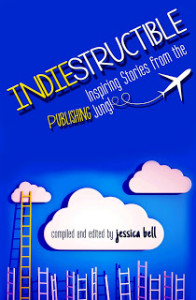With a foot in both camps, indie author, poet and musician Jessica Bell is in a great position to compare and contrast the worlds of indie publishing and indie music.
 Indie publishing already allows writers of all stripes access to the world’s readers.The industry has changed. A lot. It’s been forced into embracing the digital revolution, just like the music industry was.
Indie publishing already allows writers of all stripes access to the world’s readers.The industry has changed. A lot. It’s been forced into embracing the digital revolution, just like the music industry was.
Independent artists are everywhere now. And authors don’t self-publish because they’re too lazy to go through the slog of submitting queries to agents, or editing their manuscripts properly, or simply out of impatience to see their work in print, just like independent musicians aren’t too lazy to find a record deal. They simply have a different sound. Or they don’t want to be told by a record label what they should and shouldn’t record.
In a saturated market, where publishers/music producers have millions and millions of queries and proposals, independent artists are driven by self-belief and a passion that their work deserves a place.
Indie Publishing – Playing Catch-Up with Indie Music
But the indie publishing scene still has quite a way to go to match the acceptance the indie music scene has acquired since the advent of Internet downloads and torrents. And to be honest, I still don’t understand why it is taking so long.
There really is no reason for people to be turning up their noses at self-published books. Let’s look at where the indie music scene currently stands. I bet you can replace the music-related words with author/book-related words and each point would represent the indie publishing scene to a tee. As you will see, there is really no reason why we should still be looked down upon.
- Indie musicians thrive on the freedom it gives them to be more creative and produce music that is true to their own vision. This attracts listeners who are after something different than the mainstream.
- Indie musicians do not define themselves by their label; they define themselves by the music they produce. They are their own brand.
- Listeners love to explore new music and new sounds, always in search for their next favourite band, regardless of how the album was produced, released, or even whether it’s digital, CD or vinyl. (Vinyl is back with a vengeance, by the way. What does that tell you about the future of the paperback?)
- With the digital revolution, it’s more convenient to listen to samples online, and decide whether it’s something you really want to purchase. So there is no logical reason to complain that there is too much crappy music out there, because you can always sample before you buy.
- When listeners are after something new, they will search the style of music they enjoy (rock, pop, folk, etc), not which record label they are being distributed by. In fact, listeners who love to explore indie music will very rarely take notice of the record label, if ever.
- With the digital revolution, music is cheaper, more is being downloaded and listened to than ever before. There is room for everyone.
- Indie musicians decide when to release their work, how to release their work, which venues to play gigs at, what merchandise to sell, how many videos to upload to YouTube, how much they are going to sell their albums for, blah blah blah. No one holds them back. They have complete control.
- Indie musicians do not limit which format people can purchase their albums in. At every merchandise stall I’ve perused at a gig by an indie artist, they have everything available to you. If you purchase a CD, they’ll also give you a card, with a link to download the MP3s, etc. They have embraced the change. And they do their best to roll with the times. After all, it’s the music that is important here. Not what it’s packaged in.
 Notice how completely identical all this is to independent publishing? The indie music scene is no longer ridiculed for the less-than-perfect work out there. And more and more musicians are being discovered and loved. Because people have a choice. People can distinguish between what’s good and bad, what’s their cup of tea and what isn’t. So why all the fuss?
Notice how completely identical all this is to independent publishing? The indie music scene is no longer ridiculed for the less-than-perfect work out there. And more and more musicians are being discovered and loved. Because people have a choice. People can distinguish between what’s good and bad, what’s their cup of tea and what isn’t. So why all the fuss?
It’s time to face the music. We are all independent artists, and we are here to stay.
And if you’re afraid traditional publishing is going down the tubes, I think you’re wrong. There is always a way for both indie and traditional to thrive.
All we need to do is plug our microphones into the same amplifier.





[…] the Alliance of Independent Authors blog, Opinion: How Indie Publishing Compares to the Indie Music Scene; published October 29, […]
[…] Jessica Bell (ALLi) with Opinion: How Indie Publishing Compares to the Indie Music Scene […]
[…] Opinion: How Indie Publishing Compares to the Indie Music Scene […]
I think some of the reasons indie publishing hasn’t seen the same acceptance as indie music can be traced to the retail market.
Indie music has always been a the “farm team” for popular music. Yesterday’s fringe is tomorrow’s mainstream, from Buddy Holly to Green Day (and a thousand other examples you can think of.) The indie-to-majors pattern has been very well established in the music industry over the last sixty years. In publishing, it’s been happening sporadically for the last six.
You’ve always been able to go into a decent record store (trust me, kids, there used to be decent record stores) and buy “indie” artists. These guys created their own labels with names like Blast First, K Records, New Alliance Records, SST… and A&M. Just like authorpreneurs found their own publishing houses today, except that I’d have a very hard time getting my MWS Media books into Barnes & Noble or Waterstone’s. This is perhaps, in part, due to the fact that the indie music scene has always had retail wholesale distributors that specialized in indie music. I don’t think the same thing exists in the book retail business.
Indie music has long had a direct line to its primary demographic through college radio stations. College radio supports indie music by providing hubs of popularity that become an indie band’s touring itinerary — and then, as now, the real money in indie music is in touring. Indie publishing has a similar opportunity with podcast novels, but the comparison falls short because a platform for indie literature doesn’t exist with the same kind of evangelical megaphone indie music enjoys.
That’s off the top of my head. The especially astute among you will note I’ve just laid out two, possibly three, ideas for start-ups. Knock yourselves out..!
Let’s hope that one day a similar platform will exist. This is exactly what I meant by my final remark: “All we need to do is plug our microphones into the same amplifier.” Fingers crossed!
I like as a visitor and what I found confusing. (wry grin) I’m hoping to learn a lot from observation. I appreciated you boiling it down to key questions of what we want to accomplish with our pages, which is the whole point of having the website. Once again, thank you
Brilliant article. But too optimistic. Jessica has tried a logical comparison and also succeeded proving her point. But she has forgotten to compare the mindset of music downloaders versus book buyers. If the mindset becomes the same, struggling writers will have a field day. Till then fingers crossed. But anyway, Thx to Jessica, for suggesting a very good, and alternative approach.
I have to agree with you there. The mindset has to change. One day? I hope so …
Jessica, great job. I love the indie-music scene and go to a lot of indie-music sites because I want to hear something better than the swill that is populating the Top 20. But I never thought to compare the indie music scene with the indie-publishing scene. Very good article.
Thank you, Gregory!
jessica, very interesting article, thanks!
esp liked your last point, “Indie musicians do not limit which format people can purchase their albums in”
do you have any experience or thoughts on a comparison re subscription services, now that book content is getting its first few netflix-like services, whether for the good, bad, or too soon to say?
thanks so much!
Hi Filipe,
I’m sorry to say that I don’t have much experience with these services. But Orna Ross, or another member of ALLi might!
Sounds good, I just signed up for the newsletter, maybe get a post on this in the future – comparison of the two’s just in the beginning stages – be interesting to see how this shapes up. Thanks again. 🙂
I have been waiting for an article like this. I thought I was the only one who could see it. Now if only the consumer masses could get a hold of this and make it go viral, the publishing industry really would be changed forever and for the better.
Thanks for commenting. I couldn’t agree more.
There are healthy breezes blowing, when a thought-provoking and well-informed piece like Jessica’s appears, followed by a customarily sharp and oblique analysis from Dan. The “widely accepted and adopted outsiderdom” is indeed a curious phenomenon, and a glory to behold, and it has managed to occur in literature as well as in music, now and then throughout the decades. However, such artistic movements are beasts that are peskily resistant to being cajoled into existence, arising in their own sweet time and probably not in expected forms – but also with the capacity to be more powerful than expected when they do arrive. I share Dan’s cautious hope, therefore. Meanwhile, let’s keep moving these pieces around and scanning the horizon alertly…
Peskily resistant indeed! I think you’re absolutely right that these things tend to emerge as if from nowhere in their own good time. I’ve been having a fascinating chat the past few days with Francis who wrote last week’s excellent piece – he has some very interesting things to say about why conditions aren’t right for the emergence of a fully-fledged avant garde right now.
The breadth of Francis’s reading and knowledge there is clearly a remarkable thing, so he may well be right.
But if a fully-fledged avant garde isn’t on the cards, perhaps we could start out with a half-fledged one, then just stealthily make things fledgier and fledgier until very soon we’d be so fledgy that we’d want to write an epic poem to how fledgy we were?… It’s worth a shot, I reckon. Let’s see: I have four novellas soon to be published, whose covers (by Jane Dixon-Smith) you’ve seen, which are all pretty fledgy. You have the the whole Retro Sensualism thang goin’ on
which is dangerously fledgy . Francis can contribute some awesome fledginess, I’m sure. We should start planning something irresponsible, for Author HQ at the 2014 LBF…
that’s an irresistible call to arms!
This is a piece I wrote on the subject for Self-Publishing Review a couple of years ago when I started to notice the way that the term “indie” was morphing in meaning http://www.selfpublishingreview.com/2011/04/so-when-did-the-indie-success-stories-become-our-success-stories/
Great piece on a topic that needs to be addressed.
“Notice how completely identical all this is to independent publishing?”
No, sadly, I don’t, and that’s why I think we have a long way still to go for the same level of public excitement and kudos. A lot of the fault must go to the media, but that feeds a loop that sucks up self-published writers who then in turn restoke it. The problem is that the media is obsessed by the bottom line when it comes to self-publishing, and content rarely gets a look in. Take a similar strand of over-excitement amongst authors about the entrepreneurial possibilities opened up by Kindle, and the whole web-wide coverage of self-publishing is flooded by discussing what sells on the one hand and how to sell it on the other.
To go back to music, self-publishing is so dominated by pop it’s sometimes hard to see the rock element. And until we do see that, the public excitement and media swooning over artistic integrity won’t be there. In part, I think there are some social/structural issues at play – many musical movements with a strong indie ethos are part of wider cultural movements – artists speak for a group, that group embraces and promotes them vigorously in very tight communities, and those who hear the message from outside are drawn to it. That’s not necessarily the way it works with literature – in very few cases do writers emerge as spokespeople for a social/cultural movement and get championed by that movement. The contemporary exceptions I can think of are Alt Lit; performance poetry, especially slam; and graphic novels. None of which has quite broken through teh media barriers the way garage bands and hip hop artists did.
So, having started out not really sharing your optimism, I think my hope is restored – given time, I think indie writing can become vibrant, exciting, and that curious of phenomena – a widely accepted and adopted outsiderdom. When that happens, though, I don’t think many of the people who proudly brand themselves as indie will be part of it.
Thanks for this amazing comment. However, when I said, “”Notice how completely identical all this is to independent publishing?”, what I meant was that theoretically it’s identical, but we’re not getting the same kind of “accepting” treatment despite it. So I agree with you. It’s not identical, but it COULD be.
And to be honest, I really don’t think self-publishing is dominated by pop. It may be advertised as such to try and SELL, but I think you’ll find there is a considerable amount of content that isn’t anywhere near as commercial as you’d expect it to be. The packaging plays a huge role. I think, at the moment, SPs are afraid to allow their packaging to truly reflect what is inside out of a fear of failure. If people were just a bit more honest about what they were selling, I think we’d have a greater chance of being accepted too. There is a rock element, I think. Somewhere. It’s just hidden.
I agree, it’s as though people aren’t yet 100% sure they can go all the way. Which is why we need more out and proud refuseniks to show that you can be truly proud of doing whatever it is you do without having to try and fit it in a box.
Absolutely.